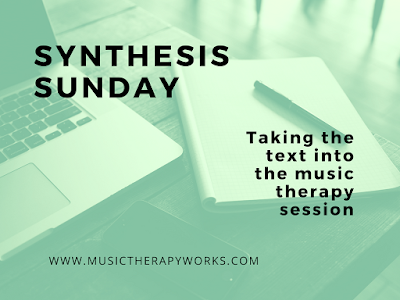Synthesis Sunday: The Final Chapter of Music Therapy in Context by Mercedes Pavlicevic
It's the end of something today. I have finally reached the end of Music Therapy in Context: Music, Meaning and Relationship by Mercedes Pavlicevic.
This has been an interesting journey through someone's thoughts and ideas about what we all do - music therapy. I have found my ideas about being a music therapist challenged by what I read in these pages, and I am glad that I've taken the time to go through this text. I haven't agreed with everything that was written, but I've found my way into understanding, and that is the most important part of any learning.
The last chapter, "Why do we become therapists," offered yet another perspective about why music therapists become therapists to begin with. Rather than a position of love for music and for helping, Ms. Pavlicevic's viewpoint appears to be from a "wounded healer" perspective (Guggenbuhl-Craig, 1971, p.177-178). I'm not sure that the perspective is the only way to engage in thinking about why we become therapists, but it did offer an opportunity for self-reflection and thought. Do I work with adolescents because I have unresolved issues with my own adolescence? Possibly. There may be some of that in my choice of population, but I don't think that is all that is going on. It did make me think.
The last sentence of the book is this:
As I move into my next textbook, I'll take what I've read here and use my altered perspective to filter that information. I think this is the reason to read - to alter perspectives into something new and evolving.
See you next Sunday.
Pavlicevic, M. (1997). Music therapy in context: Music, meaning and relationship. London: Jessica Kingsley.
This has been an interesting journey through someone's thoughts and ideas about what we all do - music therapy. I have found my ideas about being a music therapist challenged by what I read in these pages, and I am glad that I've taken the time to go through this text. I haven't agreed with everything that was written, but I've found my way into understanding, and that is the most important part of any learning.
The last chapter, "Why do we become therapists," offered yet another perspective about why music therapists become therapists to begin with. Rather than a position of love for music and for helping, Ms. Pavlicevic's viewpoint appears to be from a "wounded healer" perspective (Guggenbuhl-Craig, 1971, p.177-178). I'm not sure that the perspective is the only way to engage in thinking about why we become therapists, but it did offer an opportunity for self-reflection and thought. Do I work with adolescents because I have unresolved issues with my own adolescence? Possibly. There may be some of that in my choice of population, but I don't think that is all that is going on. It did make me think.
The last sentence of the book is this:
"I hope that the way music therapy has been explored in this book contributes to a less certain discourse, a less exact meaning, and to more musings" (p. 185)It certainly has done so for me.
As I move into my next textbook, I'll take what I've read here and use my altered perspective to filter that information. I think this is the reason to read - to alter perspectives into something new and evolving.
See you next Sunday.
Pavlicevic, M. (1997). Music therapy in context: Music, meaning and relationship. London: Jessica Kingsley.


Comments
Post a Comment